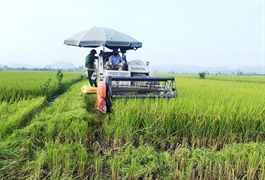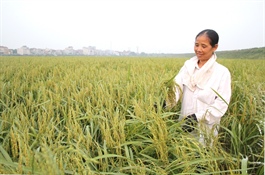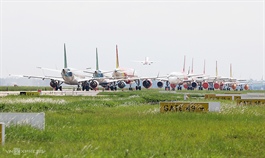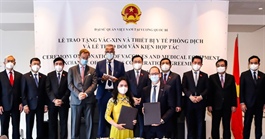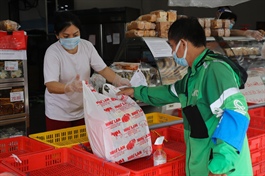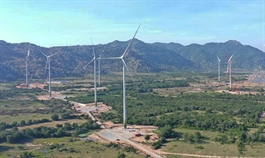ASEAN logistics sector could put on growth spurt without entry barriers: OECD
ASEAN logistics sector could put on growth spurt without entry barriers: OECD
If some of the competition restrictions in ASEAN’s logistics industry are lifted, the bloc’s economies could be better off by more than US$4.5 billion annually, the Organisation for Economic Cooperation and Development has claimed in a report titled ‘OECD Competition Assessment Reviews: Logistics Sector in ASEAN.’ 
ASEAN and the OECD launched the report together with another called ‘OECD Competitive Neutrality Reviews: Small-Package Delivery Services in ASEAN’ at the virtual ASEAN Economic Ministers Meeting on September 9.
According to the report, the logistics sector constitutes a cornerstone for the development of an integrated internal market in ASEAN.
It now accounts for 5 per cent of the bloc’s GDP and employment, providing around 17 million jobs.
But in some ASEAN member countries, logistics costs account for up to 20 per cent of the price of finished goods, almost double the global average. This is a de facto levy on consumers and businesses alike that could be reduced by addressing obstacles to competition in supply chains.
Rethinking regulations governing FDI in the logistics sector would help member states grow their economies. Some ASEAN member states still have FDI restriction in place as well as horizontal regulations that make it difficult to do business for both foreign and domestic firms.
It has been estimated that reducing barriers to trade and FDI restrictions to the global average could deliver a GDP boost of up to 17 per cent in the medium to long terms.
Additionally, pro-competitive policies have a gender dimension. Some studies have estimated that the removal of gender bias in the economy, including logistics, could increase GDP in the region by up to 30 per cent.
“If a number of the competition restrictions identified by the OECD in ASEAN’s logistics industry were lifted, the bloc’s economies could be better off by more than $4.5 billion annually. This is a very conservative estimate as it does not take into account spillover effects such as increased employment, lower barriers to market entry for small and medium-sized enterprises and improved cross-border trade.”
Ruben Maximiano, senior competition expert at the OECD, told Viet Nam News by email: “The reports find that Viet Nam has made significant progress over time in liberalising its foreign direct investment regime and is now one of the most open economies to foreign investment in Southeast Asia in terms of statutory restrictions.
“However, the reports find that for logistics, restrictions are higher than in other sectors or in comparable countries as many activities are considered conditional business sectors.
“The reports include data showing that the level of restrictiveness in the transport sector in Viet Nam is higher than in many other ASEAN countries. Such above-average restrictions in the transport sector compared to other ASEAN countries are likely to hamper competitiveness of local firms.
“Also, the broad formulation of criteria to assess FDI may result in uncertainty for investors and raise barriers to entry.
“More specifically, the reports identify some regulatory restrictions that might hinder foreign investments, such as restrictions on foreign equity for certain logistics activities (transport services by railway, road transport services or other logistics activities classified as conditional businesses).”
The OECD, in its recent report titled ‘OECD Competition Assessment Reviews: Logistics Sector in Vietnam’, recommends that the Vietnamese Government should exclude logistics-relevant businesses from the list of conditional business sectors and progressively relax foreign equity limits in the transport sector.
The two reports are the culmination of three years of independent research by OECD on regulatory and legislative obstacles to competition in the logistics industries in all 10 ASEAN member states, which was facilitated by the ASEAN Secretariat.
The reports identified legislative and regulatory issues in the logistics sector that would hinder it from reaching its full potential. They provide policy recommendations to governments to help the industry boost growth and speed up its recovery from the negative impacts of the COVID-19 pandemic.
Mathias Cormann, secretary general of the OECD, said, “As we seek to optimise the strength and the quality of the recovery, greater openness and pro-competitive reforms will be a crucial element to stimulate the growth of new businesses and jobs, especially small and medium-sized enterprises, which account for almost 90 per cent of all enterprises across the whole bloc and nearly half of all employment.”
Dato Dr Amin Liew Abdullah, chair of the AEM Meeting and minister in the Prime Minister’s Office and minister of finance and economy II, Brunei Darussalam, said, “The current economic and pandemic crisis confronting ASEAN and the world has brought on the need to reset competition policy and its implementation to suit the current economic and social context.
“Competition policy and law cannot work in isolation from other public policies and must be complemented by other related industrial policies, with robust implementation to support a competitive business environment.”







